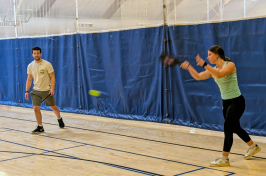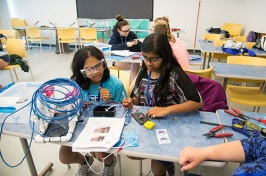
To better understand how customers view employees with disabilities, Valentini Kalargyrou staged a “play” that proved the experts wrong.
At a time when the low U.S. unemployment rate has employers looking into nontraditional groups for recruitment, people with disabilities remain twice as likely to be unemployed as people without disabilities. “People with disabilities have a lot to offer employers, but aren’t always given the opportunity to prove their capabilities and skills,” says Kalargyrou.
Her research, which studies inclusion in the hospitality industry, has examined stakeholder perspectives — e.g., employers, co-workers, customers — and overturns a key employer misconception.
“When we studied human resources staff and hiring managers our findings indicated that customer attitudes were the biggest concern in hiring persons with disabilities,” says Kalargyrou. “So, we wanted to get it straight from the consuming public.”
Kalargyrou and her colleagues got creative and partnered with the UNH Theatre Department to stage a series of hotel check-in scenarios, using student actors as front-desk agents and customers. The scenes were videotaped and shown remotely to 262 randomly selected participants who reported on what they saw.
“Some of the scenes featured staff without visible disabilities and others included staff who had a visual impairment, were hard of hearing, had an amputation and a facial mark,” says Kalargyrou.
One scenario presented a typical check-in process and another portrayed a failure scenario. After watching each enactment, the remote audience members were surveyed about their perceptions of service quality delivery as well as stereotyping towards employees with disabilities.
Kalargyrou says the results of the “typical” scenario were encouraging.
“We found no stereotyping, except for the visually impaired actor,” she says. “However, even this exception fits with the generally accepted notion that eye contact is an important part of reception, as it conveys warmth and builds trust.”
Her next paper, which will present findings from the “failure” scenario, in which the guest had a problem with their reservation, offers an equally sanguine view of actual consumer sentiments regarding disability. In other words, Kalargyrou says, “HR and hiring managers should strategically place employees with disabilities into frontline positions since guests consider their service professional and reliable.”
Kalargyrou publishes her findings in prestigious scholarly publications but she also extends her research’s impact by advising major nonprofit organizations such as Future in Sight and RespectAbility that advocate for improved employment opportunities for people with disabilities.
Gradually, says Kalargyrou, her message is getting through: “Workers with disabilities can confer competitive advantages on businesses by lowering turnover and establishing a positive company image.”
-
Written By:
Dave Moore | Freelance Writer


















































